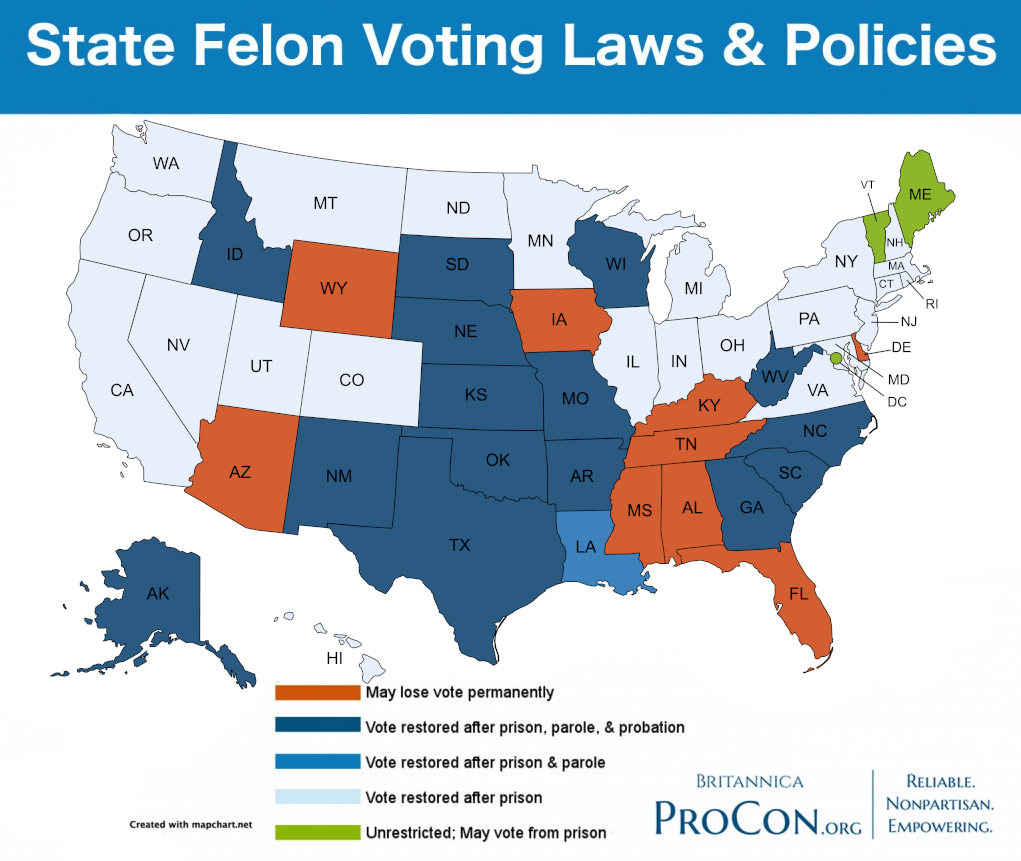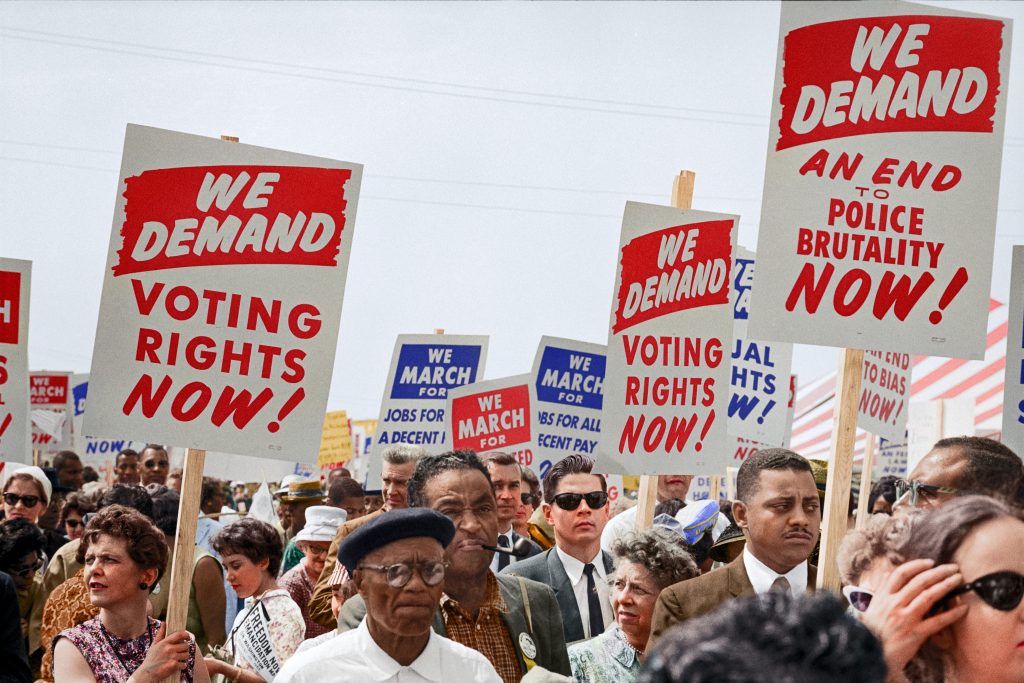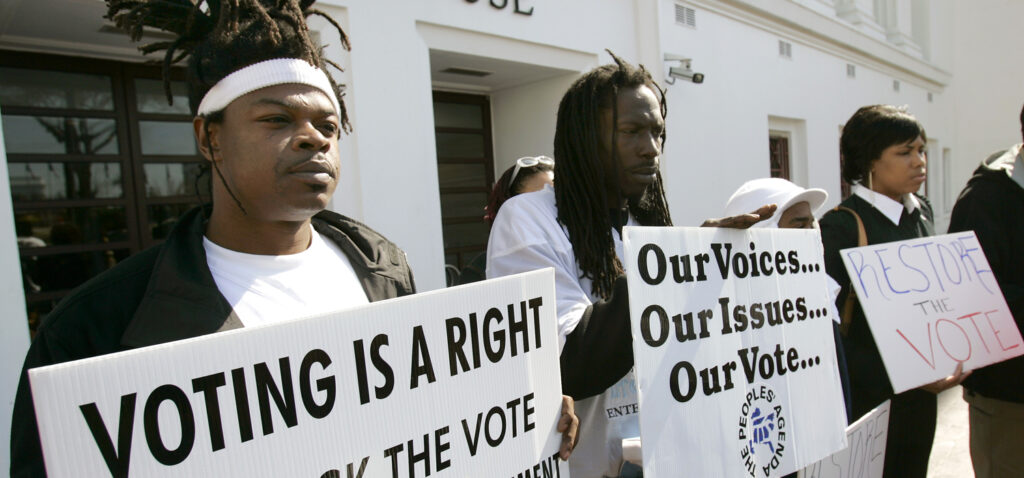Civil Death and the Denial of Democracy: Why We Must End Disenfranchisement and Fight for Rights Restoration
 Authored by Dream.Org
Authored by Dream.Org
The concept of civil death, a legal status dating back to ancient times, has cast a long and dark shadow over the lives of individuals convicted of crimes. While the term may sound like a relic of the past, the reality is that civil death continues to haunt our modern criminal legal system in the form of collateral consequences – the loss of civil rights and privileges that persist long after a person has served their sentence.
At its core, civil death involves the stripping away of fundamental rights, such as the right to vote, make contracts, inherit property, sue in court, and hold public office. Historically, a person declared civilly dead was considered "dead" in the eyes of the law, a status that could even lead to being killed with impunity in medieval Europe.
In the United States, civil death took the form of "civil death statutes" in some states during the 19th and 20th centuries. Today, the most prominent vestige of civil death is felony disenfranchisement – the loss of voting rights due to a felony conviction. This form of punishment affects millions of Americans, disproportionately impacting communities of color and perpetuating the legacy of racism and oppression in our criminal legal system.
As of 2020, an estimated 5.2 million Americans are barred from voting due to felony disenfranchisement laws. These laws vary widely between states, with some imposing a lifetime ban for people with felony convictions, while others restore voting rights upon completion of a sentence or period of parole/probation.

Felony disenfranchisement is not an inevitable consequence of a criminal conviction, as evidenced by states like Maine and Vermont, where voting rights are never stripped away, regardless of one’s conviction status. This punitive measure extends beyond the inability to cast a vote; it bars people from jury service, signing petitions for candidates or civic issues, running for elected office, and participating fully in the democratic process. The effects of felony disenfranchisement reach even further, impacting an individual's ability to influence how community resources and tax dollars are allocated. This broader exclusion from civic life underscores the critical need for reform, not only to restore voting rights but also to re-engage individuals in all facets of civic responsibility and community contribution.
Felony disenfranchisement also extends far beyond the individual, affecting families, communities, and the very fabric of our democracy. By silencing the voices of millions of Americans, particularly people of color who are disproportionately impacted by the criminal justice system, felony disenfranchisement laws undermine America’s founding principles of equality, justice, and representative democracy.
It is time for our nation to confront the harsh reality of civil death and its modern-day manifestation in felony disenfranchisement. We must recognize that the loss of civil rights is a form of punishment that extends far beyond an individual's sentence and has devastating consequences for their ability to reintegrate into society and participate in our democracy. As we work towards building a more just and equitable criminal justice system, ending felony disenfranchisement must be a top priority.
The Roots of Disenfranchisement: A Legacy of Racial Oppression
Felony disenfranchisement laws have a shameful history deeply intertwined with racial discrimination in America. Many of these laws proliferated in the late 1800s after the 15th Amendment granted African American men the right to vote. Southern states in particular used disenfranchisement, along with poll taxes and literacy tests, as tools to systematically suppress the Black vote and maintain white political control in the post-Civil War era.

By selectively enforcing laws and criminalizing African Americans for minor offenses, states could strip away voting rights without explicitly mentioning race, effectively circumventing the 15th Amendment. These laws were deliberately tailored to target crimes considered more likely to be committed by black citizens. The discriminatory intent was clear - in 1901, the president of Alabama's constitutional convention openly called for disenfranchisement to "establish white supremacy."
Today, these racially motivated laws continue to disproportionately impact communities of color:
- Over 6 million Americans are currently barred from voting due to felony convictions.
- More than 1 in 13 Black adults are disenfranchised, compared to 1 in 56 non-Black voters.
- In some states, up to 1 in 5 Black adults cannot vote due to felony disenfranchisement.
- An estimated 38% of the total disenfranchised population, or 2.2 million Americans, are Black.
The racial disparities in the criminal justice system, with African Americans facing disproportionately high rates of arrest, prosecution, and incarceration, mean these Jim Crow-era laws continue to decimate Black political power today. Felony disenfranchisement remains a key vestige of systemic racism and oppression in America.
The Ripple Effects: Undermining Communities
By silencing the voices of justice-impacted individuals at the ballot box, felony disenfranchisement laws inflict severe collateral damage on families and communities of color that reverberates across generations:
- Civic Disempowerment: Disenfranchisement prevents impacted communities from electing representatives that reflect their needs and interests. Without political influence, it is much harder to advocate for policies that could improve socioeconomic conditions and disrupt cycles of marginalization.
- Eroding Public Health: Some research suggests the loss of political and social capital caused by disenfranchisement may exacerbate racial disparities in mental health and overall well-being in impacted communities.
- Economic Devastation: A felony conviction, which triggers voting restrictions, also severely limits employment and housing opportunities due to widespread discrimination. This compounds the political disempowerment to trap justice-impacted individuals and families in poverty.
- Eroding Trust in Democracy: By denying voting rights even after a sentence is complete, disenfranchisement laws undermine efforts to facilitate civic reintegration and erode faith in the democratic process within communities of color. The message sent is that a debt is never fully paid.
- Perpetuating Recidivism: By denying voting rights even after a sentence is complete, disenfranchisement laws undermine efforts to facilitate civic reintegration, increasing the likelihood of future justice involvement.
These compounded barriers create devastating cycles of socioeconomic and political marginalization that ripple across families and neighborhoods, undermining public health, economic growth, social cohesion, and trust in American democracy itself. Restoring voting rights is critical to disrupting this vicious cycle.
The Path Forward: Expanding Democracy Through Re-enfranchisement
There is growing momentum across states to reform felony disenfranchisement laws and restore voting rights, often in a bipartisan manner. Ending this form of voter suppression is increasingly recognized as crucial to reducing recidivism, facilitating rehabilitation, and strengthening the social fabric of communities:
- Since 1997, at least 29 states have enacted laws to advance voting rights for justice-impacted individuals. In the last six years alone, eight states eliminated lifetime disenfranchisement policies.
- Evidence shows that re-enfranchisement can aid re-entry and reduce recidivism by fostering greater trust and investment in the political process and one's community. Voting helps instill pro-social values linked to desistance* from crime.
- Voter restoration efforts have overwhelming public support, with recent polls showing a strong majority of Americans favor re-enfranchising all justice-impacted individuals upon release from prison. Over 60% of both Democrats and Republicans backed reform.

Recent State Reforms and Efforts
Several states have made significant strides in reforming their felony disenfranchisement laws in recent years, expanding voting rights for justice-impacted individuals:
- In 2018, Florida voters overwhelmingly passed Amendment 4, automatically restoring voting rights to most individuals with felony convictions upon completion of their sentences. This re-enfranchised an estimated 1.4 million Floridians, but Republican lawmakers subsequently passed a law requiring payment of all fines and fees before rights restoration.
- California and Washington recently restored voting rights to individuals on parole.
- New York took legislative action to automatically restore voting rights upon release from prison.
- Colorado and Nevada enacted laws restoring rights to individuals on parole and probation.
- Iowa used an Executive Order in 2020 to restore voting rights that were permanently severed upon the conviction of a felony offense after a person completes a term of incarceration and any post-incarceration supervision in parole or probation.
Several other states, including Minnesota, New Mexico, Nebraska, Arizona, Mississippi, Alabama, and Tennessee, have passed some reforms or are currently considering reforms to their felony disenfranchisement laws.
Federal Legislation: The Democracy Restoration Act
At the federal level, the proposed Democracy Restoration Act would restore voting rights in federal elections to all individuals with felony convictions upon release from prison, re-enfranchising an estimated 4.6 million Americans. The bill has been introduced multiple times but has not yet received a vote in Congress.
Building Bipartisan Support and Overcoming Challenges
However, these efforts face political challenges and opposition from some lawmakers and groups who argue that individuals should complete all terms of their sentence before regaining the right to vote. Some also express concerns about the partisan impact of re-enfranchising justice-involved voters.
Advocacy groups like the Sentencing Project, Campaign Legal Center, Florida Rights Restoration Coalition, and dozens of state-level organizations are working to build bipartisan support for reform, assist impacted individuals, and dispel misconceptions about voting rights restoration. These groups emphasize redemption, second chances, civic engagement, and public safety in making the case for reform.
Empowering Impacted Communities
As the movement to end felony disenfranchisement gains momentum, directly impacted communities must remain at the forefront of these efforts. Restoring voting rights is not only about political participation but also about human dignity, redemption, and the full restoration of citizenship. With millions still disenfranchised, the work of dismantling this draconian system and building a more inclusive democracy continues.

It is extremely troubling when politicians in states that have made positive change begin to dismantle that progress based on politics and ignorance. Unfortunately, that is what is occurring in Virginia. We must stay focused and engaged and ensure we continue the march toward freedom, inclusion, and equity for all people in our country.
To fully realize the promise of democracy and advance racial equity, we must:
- Eliminate all forms of permanent disenfranchisement and automatically restore voting rights upon release from prison;
- Abolish financial and procedural obstacles to voter restoration;
- Promote voter education and registration in justice-impacted communities;
- Advocate for passage of the federal Democracy Restoration Act and restoration of rights in the states, whether in your state or the efforts in other states.
Freedom, dignity, and inclusion in society don’t have borders or political parties. These issues affect all of us, as we are not a democracy representative of all the voices if we arbitrarily disenfranchise our citizens. We must all come together and demand the end of disenfranchisement as a penalty for a criminal conviction.
By dismantling discriminatory disenfranchisement laws and restoring voting rights, we can write a new chapter in American history. This isn't just about justice for the millions impacted – it's about strengthening our democracy and ensuring every voice is heard. Join the movement – sign the petition, contact your representatives, and demand an end to Civil Death and felony disenfranchisement. Together, we can build a more inclusive democracy where the right to vote empowers all citizens.
